St. Ambrose Music Professor Looks Back on 2019 Oscar Night, Considers A 2021 Nomination
Bill Campbell attended the 91st-annual Academy Awards ceremony at the Dolby Theatre in Los Angeles exactly two years ago, Feb. 24, 2019.
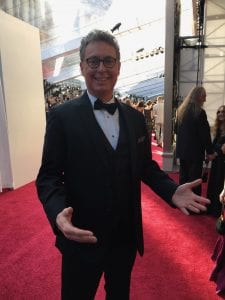
Campbell got to attend the 91st-annual Oscar ceremony in Los Angeles in 2019.
And he may be part of another Oscar nominee this spring.
“It was quite an amazing experience to be part of it,” he said of the 2019 event Wednesday. “Throughout the whole day and night, I kept reminding myself, I’m here because I wrote music for a film that’s all about trying to help people. And that felt good.
“It did feel a little bit odd being there and celebrating it, but we worked hard for it and that was good,” Campbell said. “It was really exciting, because there were so many people there. There were A-listers, and there were people like me just walking around.”
The St. Ambrose University music professor – and prolific composer — wrote the music for the 2018 documentary “Lifeboat,” which was nominated for Best Documentary Short.
This month, MTV Documentary Films has added “Lifeboat” director Skye Fitzgerald’s Hunger Ward to its portfolio of Oscar-contending films.
In 2020, Campbell wrote his sixth film score for Fitzgerald, with “Hunger Ward,” which has made the 93rd-annual Academy Award shortlist for Best Documentary Short Subject (of 10 films), out of 114 that qualified in the category.
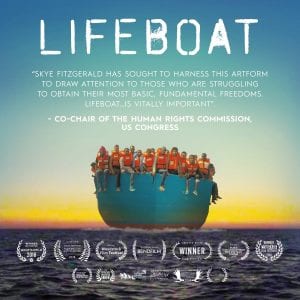
“Lifeboat” concerned a 2016 journey of refugees who sought to escape Libya, across the Mediterranean Sea, to Europe.
The MTV division led by Sheila Nevins announced Tuesday it acquired the 40-minute film, a devastating look at children suffering starvation in Yemen as a direct result of war in the Middle Eastern country. “Hunger Ward,” which made the Oscar shortlist earlier this month, will premiere on Pluto TV March 1.
The 2021 Oscar nominations will be announced March 15, and the awards (for films released Jan. 1, 2020 through Feb. 28, 2021) will be given out April 25. Last year’s ceremony was Feb. 9, 2020.
In 2019, Campbell sat in one of the balconies at the 3,400-seat Dolby Theatre, with Fitzgerald and the film’s editor and videographer. “Lifeboat” was Fitzgerald’s first Oscar nomination.
“For a very brief moment on television, like six seconds, my music was played when the documentary shorts were being introduced,” Campbell said.
His wife, Michelle, wasn’t disappointed not to be in the Dolby during the star-studded night — because instead, she was in West Hollywood attending Elton John’s 27th annual Oscar-viewing party, which supports his AIDS Foundation.
“She had a great time; she was hobnobbing with all kinds of people – meeting actresses from ‘Game of Thrones’,” Campbell said. “Afterward, we all got back into our limo, we picked her up and went out a bit longer after the whole thing.”
“It was a great honor to be there, and to be nominated, and to be part of that whole scene,” he said of the Oscars. “It was a great time to be there with the team that put the film together, because it was a big celebration for us, and validation of all the work we’ve done over the
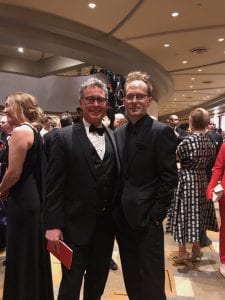
Campbell, left, with Skye Fitzgerald at the Academy Awards on Feb. 24, 2019.
years.”
When Campbell first heard “Lifeboat” was nominated for film’s greatest honor, “I was so excited, and really happily surprised,” he said in 2019. “I thought it was quite an underdog as potential for getting in.
“’Lifeboat’ being in there in the short documentary, it didn’t surprise people on the outside, but it did surprise those of us inside. We knew what we were up against,” Campbell said.
Among other honors, that 35-minute documentary about desperate refugees fleeing Libya by boat earned Best Short at the Mountainfilm documentary film festival in Telluride, Colo.
Campbell penned music for Fitzgerald, in 2015, for the first in the refugee trilogy (including “Lifeboat” and “Hunger Ward”) — “50 Feet From Syria.” It was shortlisted for an Oscar nomination along with 10 other films, but it did not make the final cut of nominees.
“Lifeboat” focuses on the German nonprofit Sea-Watch, which in 2016 helped refugees braving the dangerous crossing of the Mediterranean Sea from Libya to Europe. One such mission, piloted by British captain Jon Castle, plucks refugees from several tiny boats and carries them to safety. During the journey, refugees reveal how poverty, violence and sexual trafficking forced them to flee their homes.
“The greatest humanitarian crisis”
Nevins of MTV Documentary Films said of “Hunger Ward”: “The greatest humanitarian crisis exists in Yemen. Children are starving to death in front of America’s eyes. Filmmaker Skye Fitzgerald has made a documentary that says ‘no more.’ It is a must see for anyone with heart.”
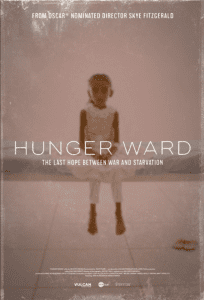
“Hunger Ward” has been named to the 10-film Academy Award shortlist for a 2021 Best Documentary Short Subject honor.
“I am honored that MTV Documentary Films will bring Hunger Ward’s urgent message of the humanitarian crisis affecting children of Yemen to a broad and engaged audience,” Fitzgerald said, according to Deadline.
MTV Documentary Films’ Nina L. Diaz and Liza Burnett Fefferman added: “Skye has made a powerful and harrowing film that has the capacity to save a nation’s children from malnourishment. We’re honored to bring this incredibly important issue to the forefront and raise awareness of this devastating humanitarian crisis.”
Among the children featured in Hunger Ward is Abeer, a six-year-old girl who weighs only 12 pounds and Omeimi, a 10-year-old girl who weighs but 24 pounds.
Fitzgerald filmed his documentary at two medical clinics that treat malnourished children — one in South Yemen, a part of the country controlled by the Saudi-backed Yemeni government, and one in North Yemen, an area controlled by Iranian-backed Houthi rebels.
Earlier this month President Biden called for an end to the war in Yemen and announced his administration would no longer support Saudi Arabia’s military operations in the country. Biden’s predecessor, President
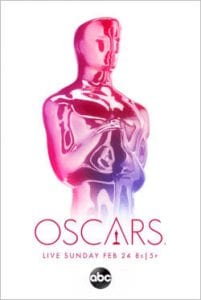
The 91st-annual Academy Awards in February 2019 gave the Best Picture to “Green Book.”
Trump, was criticized for continuing to sell arms to Saudi Arabia despite its bombing campaign in Yemen and the naval blockade it imposed that has disrupted emergency food distribution.
According to a report issued Feb. 12 by several U.N. agencies, more than two million children in Yemen under the age of five are expected to suffer from acute malnutrition this year. Of those, 400,000 young children could die from starvation, the report said.
“I wake up every morning knowing that there are children dying for lack of nutrients, when our planet has plenty of nutrients to go around,” Fitzgerald told Deadline. “It’s one thing to know something like that intellectually, and it’s a completely different thing to have witnessed it, and recorded it, and documented it,”. “That lives with me all the time. It’s something that we can actually do something about because it’s a human-caused tragedy, and it’s one that can be solved by humans.”
“Hunger Ward” is “about the terrible humanitarian crisis happening right now in Yemen,” Campbell said. “It’s not easy to go and do what he does.”
Meeting at university in Oregon
Campbell first met Fitzgerald, the documentary filmmaker, over 20 years ago when they were both at the University of Oregon – Skye was an MFA student and Bill was a PhD student, and Campbell wrote music for a school play he directed.
Campbell wrote for Fitzgerald’s first documentary, “Curve 155” in 2001.
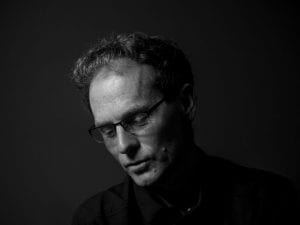
Fitzgerald first met Campbell when they were graduate students at the University of Oregon.
Regardless of genre (for live performance or film), any music he writes – “they’re all evocative; they all bring images into people’s minds,” Campbell said. “I take people on some kind of a journey, some kind of story with the music. So I think that’s a commonality through all my music.”
It is different when he writes for live performance, he said. “I’m not serving the visuals up on the screen. The visual in front of everybody is the musicians themselves. So I’m able to do a lot more with music for concerts; it’s just different.”
Music for a film is always in service of what’s on the screen. “It’s an integral part – without the music, of course, films don’t work,” he said. “I write music differently for concert than I would for film. In a concert, that’s what’s going on, that’s it.”
A 51-year-old native of Tucson, Ariz., Campbell has been writing electronic music since high school (recording onto a computer), and first got into composing when he was 11 (with piano pieces).
He holds three degrees in composition, including the doctorate from University of Oregon. Campbell’s concert works include “Where the
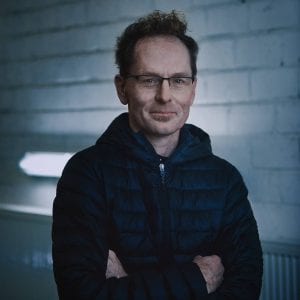
Documentary filmmaker Skye Fitzgerald earned his first Oscar nomination for the 2018 documentary short, “Lifeboat.”
River Bends” for the Quad City Symphony Orchestra’s 100th anniversary season and “Veni Redemptor” for the St. Ambrose Chamber Singers. In 2012, the QCSO premiered his “Coyote Dances,” an arrangement of a 2005 work originally written for wind ensemble.
His composition awards include multiple ASCAP Plus Awards, the Penfield Music Commission Project Composition Prize (2006), a Waging Peace International Composition Special Honor (2003), a Tucson/Pima Arizona Arts Fellowship (1999) and the 1995 Jim Highsmith Award from the San Francisco Conservatory of Music for his orchestral work, “Sinfonietta.”
In 2011, the Kennedy Center American Collegiate Theater Festival awarded Campbell’s original score for a new adaptation of “Oedipus Rex.”
In addition to the Fitzgerald humanitarian trilogy, he has composed scores for the director’s socially conscious films “Finding Face” and “Bombhunters,” and in 2019 completed music for Moline-based Fourth Wall Films’ “Sons & Daughters of Thunder,” about the first public debates on the abolition of slavery. That latter score was nominated for a 2020 Mid-America Emmy.
It’s important that the films Campbell has scored with Fitzgerald and Fourth Wall have a strong social-justice component.
“If I’m going to be spending time working on a film, I want it to be a worthwhile endeavor,” he said Wednesday. “There have been things over the years that I’ve said ‘no’ to. For the most part, I really do enjoy working on music that’s going to help make a difference, and hopefully make the world a better place.”
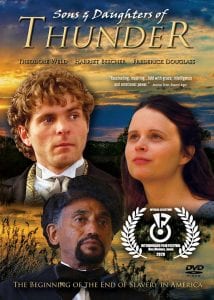
Campbell penned the music to the 2019 docudrama “Sons & Daughters of Thunder,” about the first public debates of slavery’s abolition, in 1834.
“I’ve always been spiritual and very concerned about the fellows all around me,” Campbell said. “I’m much more spiritual, but I think most people are right now. We’re not able to do a lot of the religious expression because of Covid. I’ve always been interested in developing as a person, and felt compelled always to help people in the ways I can as an artist.”
“I like to be around people that want to do similar things,” he said. “Maybe those are reasons I’m at St. Ambrose and St. Paul’s.”
Campbell has been director of contemporary music at Davenport’s St. Paul Lutheran Church for 14 years and teaching at SAU (a private Catholic school) for 16 years. For Sunday services since last March, he records music from the church and home for online streaming. He also edits music done by others for the videos.
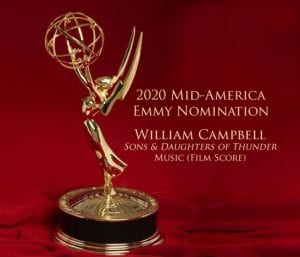
Campbell was nominated for a regional Emmy Award last fall for his score to “Sons & Daughters of Thunder.”
Campbell also writes for theater and dance, including Latina Dance Project’s international touring show Coyolxauhqui ReMembers. Always open to fun projects, he also wrote a completely different type of music for the 2011 zombie film Cadaver Christmas, with the soundtrack released through Howlin’ Wolf Records.
“I think the work I’ve done as a composer in the acoustic world really helps my electronic music sound different than other people’s,” he said. “And by adding the electronic into the acoustic world, I’m able to get something different. I’m not unique in all these things.”
“If I’m in my studio, I know exactly how I want the sample to sound, and I’ll manipulate that sound so that it sounds almost exact to the way that someone would play it,” Campbell said. “Sometimes I’m even pretending I’m playing it. I’m writing it like there’s a real person there.”
And the sample sounds are from some of the best musicians in the world, he said.
Campbell is a big admirer of 59-year-old composer Alexandre Desplat (who has 192 credits to his name), whose scores include “The Queen,” “The King’s Speech” and “Argo.” He won Oscars (among 11 nominations) for “The Shape of Water” (2017) and “The Grand Budapest Hotel” (2014).
“He’s incredible. His scores, each of them sound different from each other,” Campbell said. “It sounds like he’s improvising for all the musicians he’s writing for, it’s so free, his music. It sounds like pure expression, moving right through him. It’s excellent music and it’s also excellent music for the film.”
New film shot before pandemic

MTV Documentary Films has acquired the distribution rights for “Hunger Ward,” which will debut nationally March 1.
Fitzgerald finished filming “Hunger Ward” last March, before the pandemic shutdown, and Campbell worked with him over the summer on music and editing.
By May, he had written a version of the opening sequence of the 40-minute movie, ending up creating about 22 minutes of music altogether – all recorded from his Davenport home studio, with synthesizers and computer software.
Music for the three refugee films are what Campbell calls “a dark, ambient genre,” he said Wednesday. “This one in particular is leaning more towards ambient. Once again, there’s chamber strings and electronic sounds.”
Ironically, as a pianist, he didn’t write or record any piano for the score.
“For the most part, I’m providing some emotional content through the music and also, putting people into that space environmentally,” Campbell said.
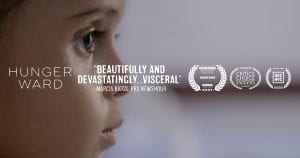
The 40-minute film will have a free virtual screening Thursday, Feb. 25 at 5 p.m.
Compared to the other two scores, he used some remote musicians for “Lifeboat,” combined with digital samples and electronic music, and “50 Feet From Syria,” he used acoustic piano and electronic.
Campbell watched the online New York City documentary film festival in November, in which “Hunger Ward” was shown. It was part of DOC NYC, America’s largest documentary festival, and its influential 15-film Short List.
MTV Documentary Films is part of the media giant Viacom, and this is the first time one of Fitzgerald’s films has been distributed by it.
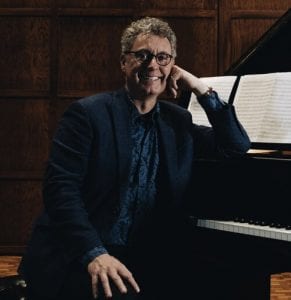
Bill Campbell has written eight film scores, including six for director Skye Fitzgerald.
“He was working to get distribution for a while; he’s very happy to get distribution through this group,” Campbell said. “Lifeboat” was distributed online through The New Yorker, and “50 Feet From Syria” was streamed on Netflix.
“Hunger Ward” will be shown Thursday, Feb. 25 at 5 p.m. in a free virtual screening hosted by the Friends Committee on National Legislation (a nonpartisan Quaker organization that lobbies Congress) and Spin Film. It will be followed by a panel discussion including U.S. Rep. Adam Smith (D-Wash.), Fitzgerald, and the president of the Yemeni Relief & Reconstruction Foundation.
The film was borne out of a sense of urgency at the sustained civilian suffering caused by the human-caused famine in Yemen, according to the filmmaker.
“Hunger Ward” documents the human cost of the ongoing conflict in the country and will serve to
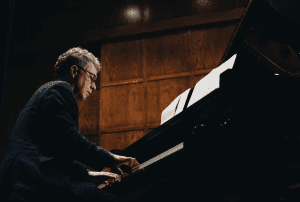
Bill Campbell is a music professor at St. Ambrose University and director of contemporary music at St. Paul Lutheran Church.
catalyze debate surrounding a largely forgotten war, Fitzgerald has said.
“We are striving to create a film that activates both the heart and the intellect while simultaneously laying bare American complicity in the current civilian deaths in Yemen. We believe bringing to an audience the specter of a human-caused, preventable famine made possible by American tax dollars will ultimately strengthen the call for legislative reform surrounding U.S. military assistance to the Middle East.”
Campbell isn’t sure what the next Oscar ceremony will be like, even if the film makes it and he gets invited again.
“I’d love to be able to hop on a plane and go out to L.A.,” he said. “But most of L.A. is pretty well shut down, so it wouldn’t be like any other year, when you can go out to L.A. and hang out in Hollywood.”
“I think it’s gonna be online, virtual,” Campbell said. Currently, he is recording a new album of solo piano music, planned to be done by the end of March.
For more information on the composer, visit www.williamcampbellmusic.com. For more on the film, visit www.hungerward.org.









